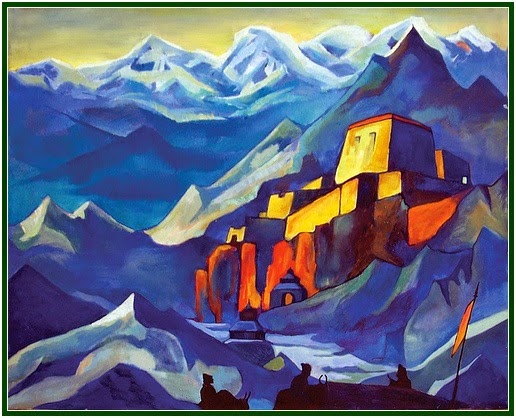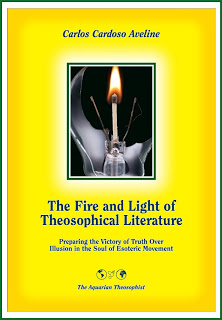
The Universal Wisdom Expressed In a Few Words
Helena P. Blavatsky

The Himalayas, in a painting by Nicholas Roerich
0000000000000000000000000000000000000000
A 2014 Editorial Note:
In 1890, a compilation was published in
London of Eastern thoughts which had been
collected and written down by H. P. Blavatsky.
It presented one idea for each day of the year
and had the title “Gems From the East”. The
book is now part of volume XII in the “Collected
Writings” of H.P.B. The following axioms are a
selection from the months of June and July.
(Carlos Cardoso Aveline)
00000000000000000000000000000000000000000000
You cannot build a temple of
truth by hammering dead stones. Its
foundations must precipitate themselves
like crystals from the solution of life.
H. P. B.
* Judge the tree by its fruits, man by his deeds.
* Theosophy is not the acquirement of powers, whether psychic or intellectual, though both are its servants.
* Neither is Theosophy the pursuit of happiness, as men understand the word; for the first step is sacrifice, the second, renunciation.
* Life is built up by the sacrifice of the individual to the whole. Each cell in the living body must sacrifice itself to the perfection of the whole; when it is otherwise, disease and death enforce the lesson.
* Theosophy is the science of life, the art of living.
* Harmony is the law of life, discord its shadow; whence springs suffering, the teacher, the awakener of consciousness.
* Through joy and sorrow, pain and pleasure, the soul comes to a knowledge of itself.
* The eyes of wisdom are like the ocean depths; there is neither joy nor sorrow in them. Therefore the soul of the disciple must become stronger than joy, and greater than sorrow.
* We hate but those whom we envy or fear.
* Self-knowledge is unattainable by what men usually call “self-analysis”. It is not reached by reasoning or any brain-powers.
* Real self-knowledge is the awakening to consciousness of the divine nature of man.
* Will is the offspring of the Divine, the God in man; Desire, the motive power of the animal life.
* Will is the exclusive possession of man. It divides him from the brute, in whom instinctive desire only is active.
* To obtain the knowledge of self is a greater achievement than to command the elements or to know the future.
* Fear is the slave of Pain, and Rebellion her captive.
* Spirituality is not what we understand by the words “virtue” and “goodness”. It is the power of perceiving formless, spiritual essences.
* The discovery and right use of the true essence of Being – this is the whole secret of life.
* When desire is for the purely abstract- when it has lost all trace or tinge of “self” – then it has become pure.
* Adepts are rare as the blossom of the Udumbara tree. [1]
* Will and Desire are both absolute creators, forming the man himself and his surroundings.
* Will creates intelligently; Desire blindly and unconsciously.
* Man makes himself in the image of his desires, unless he creates himself in the likeness of the Divine, through his will, the child of the light.
* Theosophy is the vehicle of the spirit that giveth life; consequently, nothing dogmatic can be Theosophical.
* Some pluck the fruits of the tree of knowledge to crown themselves therewith, instead of plucking them to eat.
* It is not necessary for truth to put on boxing-gloves.
* You cannot build a temple of truth by hammering dead stones. Its foundations must precipitate themselves like crystals from the solution of life.
* When a certain point is reached, pain becomes its own anodyne.
* Many a man will follow a misleader. Few will recognize truth at a glance.
* Be persuaded that those things are not your riches which you do not possess in the penetralia of the reasoning power.
* No one is free who has not obtained the empire of himself.
* It is excellent to impede an unjust man; but if this be not possible, it is excellent not to act in conjunction with him.
* Sin should be abstained from, not through fear, but for the sake of the becoming.
* Vehement desires about any one thing render the soul blind with respect to other things.
* Many men who have not learnt to argue rationally, still live according to reason.
* The equal is beautiful in everything, but excess and defect do not appear so.
* It is the property of a divine intellect to be always intently thinking about the beautiful.
* As two pieces of wood may come together in the ocean, and having met, may separate again; like this is the meeting of mortals.
* Youth is like a mountain-torrent; wealth is like the dust on one’s feet; manhood is fugitive as a water-drop; life is like foam.
* Who fulfills not duty with steadfast mind, duty which opens the portals of bliss, surprised by old age and remorse, he is burned by the fire of grief.
* Who performs a right action, free from impurity, the house of that man is a forest hermitage.
* As the streams of a river flow on, and return not, so pass away the days and nights, taking away the lives of men.
* Let the wise think on wisdom as unfading and immortal; let him fulfill his duty as though Death grasped him by the hair.
* The sage does not say what he does; but he does nothing that cannot be said.
* The heart of the fool is in his tongue; the tongue of the wise is in his heart.
* The wise man does good as naturally as he breathes.
NOTE:
[1] Adepts are sages who transcended the present human realm. The Udumbara tree (fícus glomerata) gives fruit at intervals of many centuries. (CCA)
000
On the role of the esoteric movement in the ethical awakening of mankind during the 21st century, see the book “The Fire and Light of Theosophical Literature”, by Carlos Cardoso Aveline.

Published in 2013 by The Aquarian Theosophist, the volume has 255 pages and can be obtained through Amazon Books.
000